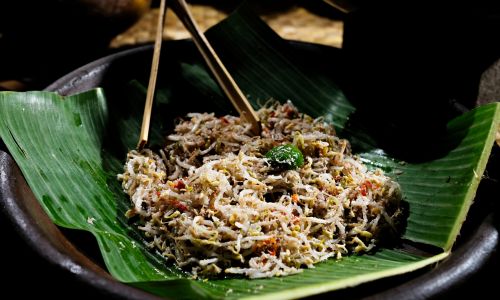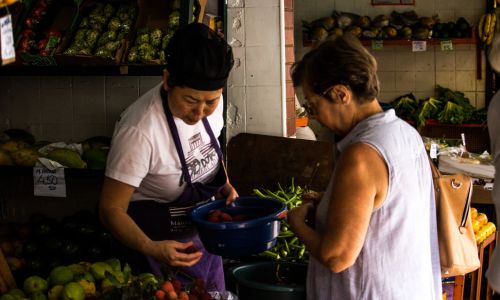In Bali, food is more than just fuel it’s a way of life. Rooted in the island’s philosophy of Tri Hita Karana, which emphasizes harmony between humans, nature, and the divine, eating sustainably is not only good for your body but also for the environment and community.
Bali’s markets brim with tropical produce, its villages thrive on age-old traditions of plant-based cuisine, and eco-conscious eateries across the island are redefining what it means to eat responsibly.
Whether you’re a traveler seeking vitality during your adventures or a local aiming to live more mindfully, sustainable eating is a path that blends health, culture, and care for the Earth.
Here are six practical yet impactful ways to integrate sustainable eating into your daily life drawing inspiration from West Bali’s lush landscapes, fertile soils, and vibrant food culture.
1. Shop Locally and Seasonally for Fresh, Eco-Friendly Ingredients
One of the simplest yet most powerful habits you can adopt is shopping locally and seasonally. By sourcing ingredients from Bali’s traditional markets such as Pasar Pemuteran or Pasar Tabanan you not only enjoy fresher produce but also reduce carbon emissions from long-distance transportation.
Seasonal fruits and vegetables are not just cheaper but also more nutritious. For example, papaya (November–March) is packed with vitamin C, with just one cup delivering over 100% of your daily needs boosting immunity and keeping skin radiant in Bali’s sunny climate. During April–October, sweet potatoes and salak (snake fruit) dominate the stalls, offering fiber and antioxidants that help balance digestion.
Visiting markets also immerses you in Bali’s lively food culture. Arrive early, between 6:00–9:00 AM, when farmers bring freshly harvested greens like kangkung (water spinach) or bunches of turmeric for just IDR 5,000–10,000. By choosing these, you directly support local farmers and small vendors, ensuring their livelihoods thrive.
💡 Tip: Bring a reusable bag or basket to avoid plastic waste. Ask vendors for organic or just-harvested produce to get the best quality while practicing sustainability.
2. Embrace Plant-Based Proteins for Health and Sustainability

Bali’s culinary heritage is rich in plant-based proteins, which provide essential nutrients while being far lighter on the planet than meat production. Tempeh, tofu, and mung beans are affordable staples in villages like Gilimanuk and are central to West Bali’s everyday meals.
Tempeh is particularly special it’s fermented in banana leaves, a traditional process that enhances flavor while adding probiotics for gut health. A 100g serving contains around 19g of protein, making it an excellent source of sustained energy for hikers heading to West Bali National Park or divers exploring Menjangan Island.
Cooking tempeh is simple yet versatile. Slice and marinate it with turmeric and soy sauce, then pan-fry in coconut oil for a crispy, nutrient-rich snack. Add it to nasi campur, toss into salads, or crumble into stir-fries with kangkung for a wholesome, protein-packed dish.
💡 Tip: Prioritize locally made tempeh and tofu over packaged imports. Not only does this support village producers, but it also guarantees freshness and quality.
3. Minimize Food Waste with Smart Meal Planning
Food holds deep spiritual value in Bali, often offered daily in canang sari (offerings). Throwing it away is seen as disrespectful, so minimizing waste is both a cultural and ecological responsibility.
Begin with meal planning. Buy smaller quantities such as half a kilogram of greens or just two mangoes to ensure everything gets used while it’s still fresh. Turn yesterday’s rice into nasi goreng, or blend overripe bananas and papayas into smoothies with coconut milk for a creamy dessert.
West Bali households also embrace composting, turning vegetable scraps into nutrient-rich soil for gardens. It’s a sustainable cycle that mirrors Bali’s agricultural traditions.
💡 Tip: Wrap leafy greens in a damp cloth to extend freshness for two days. Freeze fruits like bananas or mango chunks to use later in smoothies instead of tossing them out.
4. Cook with Minimal Processing to Preserve Nutrition

Balinese cooking is naturally aligned with sustainability. Instead of heavy frying or overcooking, local warungs often prepare vegetables by steaming or lightly stir-frying methods that keep meals nutrient-dense and flavorful while using less energy.
Take sayur urab, a mixed vegetable salad with grated coconut and bumbu spices. Lightly steamed kangkung retains its iron, folate, and vitamin A, while the coconut dressing adds healthy fats for better nutrient absorption. Another example is pepes jamur, mushrooms wrapped in banana leaves and steamed with turmeric, lemongrass, and chili zero plastic, zero waste, and packed with flavor.
💡 Tip: Try incorporating raw or lightly steamed greens into your meals. This not only saves energy but also maximizes vitamin retention, especially for heat-sensitive nutrients like vitamin C.
5. Spice It Up with Local Flavors and Wellness
Spices are the soul of Balinese cuisine. More than just seasoning, they are powerful healing ingredients deeply rooted in traditional wellness practices like jamu.
Turmeric, abundant in Bali’s fertile volcanic soils, contains curcumin—an anti-inflammatory compound that supports joint health and immunity. Galangal aids digestion, while lemongrass adds freshness and antimicrobial benefits. Together, these spices not only elevate flavor but also nurture overall health.
For a simple immunity-boosting jamu, blend turmeric with tamarind and palm sugar, then chill for a refreshing, energizing drink. At markets, fresh turmeric roots cost as little as IDR 5,000, making them one of the most affordable superfoods available.
💡 Tip: Always pair turmeric with black pepper to enhance curcumin absorption. It’s a small trick used in traditional Balinese kitchens for maximum benefits.
6. Support Eco-Conscious Eateries and Local Producers

Finally, where you choose to dine also shapes your impact. Bali is home to a growing movement of eco-conscious warungs and cafes, especially in West Bali, where the food scene embraces farm-to-table practices.
Imagine savoring gado-gado with freshly harvested greens in a Pemuteran warung, or enjoying tempeh curry wrapped in banana leaves at a coastal eco-lodge. These eateries often partner directly with local farmers, minimize waste, and avoid single-use plastics reflecting Bali’s evolving zero-waste ethos.
Supporting these establishments not only guarantees you fresher, healthier meals but also strengthens Bali’s food networks and uplifts communities.
💡 Tip: Look out for “harvest specials” on menus. These dishes are usually prepared with ingredients picked that very morning, ensuring the highest freshness and sustainability.
A Way of Life in West Bali
Sustainable eating is not about strict rules it’s about aligning your choices with values that respect both your body and the planet. In West Bali, this lifestyle feels natural. Markets brim with papayas, turmeric, and kangkung; warungs serve hearty, plant-based meals; eco-lodges highlight locally grown ingredients in menus that fuel your adventures.
By integrating these six habits shopping locally, embracing plant-based proteins, reducing waste, cooking simply, using healing spices, and supporting eco-conscious eateries you step into a way of eating that is nourishing, flavorful, and mindful.
For a truly immersive experience, visit AVOCADO RESTO in West Bali, where plant-based dishes like tempeh salads, turmeric curries, and spiced jackfruit creations embody the island’s fresh, sustainable spirit.
With its ocean-side setting and commitment to wellness, it’s more than a meal it’s a celebration of Bali’s vibrant food heritage and a reminder that what we eat can change the world.erene, ocean-side setting that embodies Bali’s commitment to wellness and sustainability.
